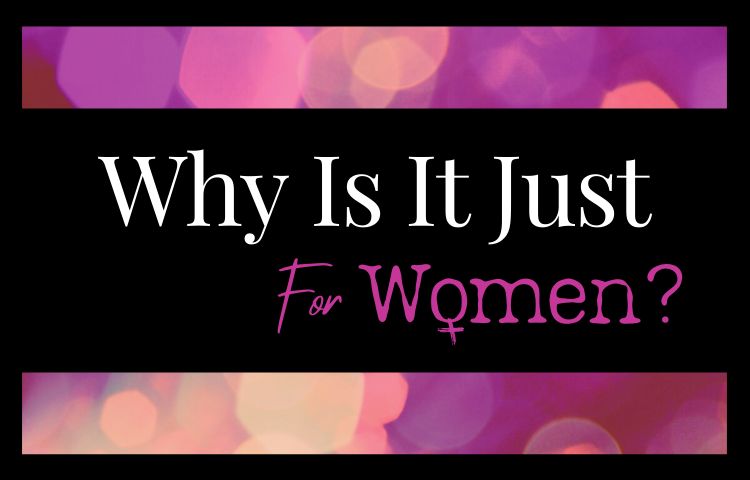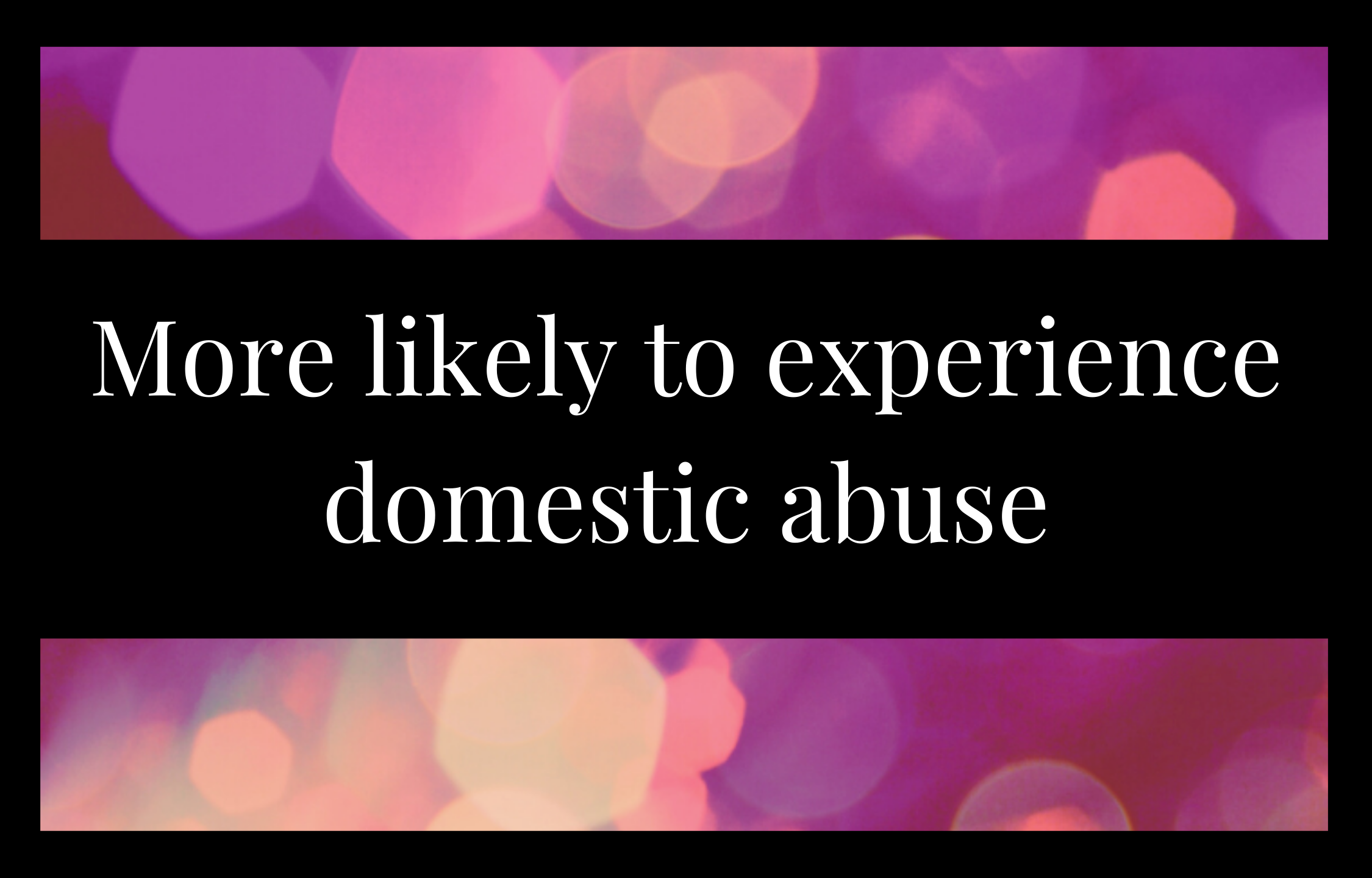
Well, we have been asked that question many times, often accompanied by a suspicious, raised eyebrow - we can assure you that we’re not man-haters here!
The impact that ADHD has on every person is completely unique. But, there are very real reasons for splitting ADHD into gender categories and we strongly believe it should be treated and supported as such - as do many, highly respected experts within this field.
This is true… the condition does not change its characteristics dependant on the gender of its ‘host’. Rather, the symptoms are dictated by the ‘host’ itself (the individual).
When the host is female, the symptoms experienced, and the life challenges that are faced, are often in stark contrast to those experienced by their male counterparts.
Of course, that’s not to say that men with ADHD don’t face their own unique set of challenges due to their ADHD. But they’re not the same and research is now starting to gain a broader understanding of some of the reasons behind this…
Hormonal Impacts
The majority of us are well aware of how significantly women's hormone levels can change from one moment to the next. We typically experience the same pattern - that many of us have reluctantly become accustomed to re-living every 26 to 30 days. But, we also experience drastic changes during puberty, pregnancy, postpartum and menopause too, which can wreak havoc on ADHD symptoms.
Gender Inequalities & Social Expectations
Society is a big problem for women with ADHD. Although the last few decades have seen large leaps in the right direction for reducing gender inequalities and gender role expectations, we are still miles away from where society should be.
This, of course, is an issue for all women, but the impact on a woman with ADHD is multiplied. The social expectations of women tend to tick many of the same boxes that are weaknesses / symptoms / impossibilities of having ADHD. It’s OK for a man to be disorganised, forgetful, untidy… but that’s not typically the case for many women.
Women are valued greatly on their executive function skills, how well they keep their homes, and their maternal instincts (which isn’t usually judged on how much love and time they provide their children with).
Similarly, women with ADHD often have strengths that are misunderstood, or simply not valued or respected when the pilots of those strengths are female. A good example of this would be being assertive in business. A man would often be thought of as a strong leader, grounded, head-strong, intuitive, decisive, determined, tenacious. Whereas, a woman would be far more likely to be thought of as aggressive, emotional, dramatic, argumentative, opinionated, ‘a bitch’, etc.
We could fill many pages with the strengths and weaknesses that are unacceptable for women to possess, but are accepted (or even valued and respected) if you are a man. However, we’ll leave it there for now and probably blog about it at a later date!
Higher Rate of Mental Health Problems
It is estimated that women, in general, are two to three times more likely than men are to be diagnosed with a mental health illness. But, when we add a condition like ADHD into the mix, the odds of a woman with ADHD evading mental health conditions, really are stacked heavily against them.
Unfortunately, often carrying a lot of burden with little help, us ladies with ADHD usually end up collecting mental health illnesses en-route. To add fuel to the fire, these conditions are - far too frequently - not sufficiently treated, due to the lack of understanding there is around ADHD and especially around how differently the condition impacts females. Mental health issues exacerbate the symptoms of ADHD, which, in turn, has a direct impact on mental health. And so the cycle continues, adding more layers with each revolution.
It’s often hard to spot in females
The symptoms associated most commonly in females with ADHD aren’t well known and can be far harder to spot even if they are known.
Females with ADHD are far more likely to have the inattentive subtype of ADHD. This means that they can often seem the exact opposite to what a person would typically expect a person with ADHD to present as and would usually go unidentified to the untrained eye.
Lack of Understanding Within Health & Social Care and Education Systems
We still often hear the same stories by women, being told something by an ADHD specialist that has long been debunked, such as them not having ADHD due to one of the following reasons:
They were well behaved / quiet in school
They have a job
They read books
They’re too introverted
It’s rare that an adult has ADHD
It’s rare that a female has ADHD
They weren’t presenting as having ADHD before they were 8 years old
What they’re experiencing is symptoms of stress / anxiety / depression
This lack of understanding being present amongst the specialists themselves, signifies how much of a problem this is. And, this also adds another - very worrying - layer to the problems, as oftentimes women are diagnosed with and treated for mental health illnesses that they don't have. This can be damaging not only for the obvious reasons, but it also greatly reduces their likelihood of ever becoming diagnosed with their actual condition of ADHD. After receiving and accepting a professional diagnosis, why would they research their symptoms any further?
To sum up; every step within our healthcare system is usually a challenge for a woman with ADHD. To get a referral is a challenge, to get a diagnosis is a challenge, to receive the right treatment is a challenge, to have our needs understood, considered and supported across the board is nigh-on-impossible!
The same issue exists within education. Educators have little understanding of ADHD, let alone how to identify it or adequately support children who have it. This isn’t blame that should be placed on the shoulders of teachers; they are expected to create miracles with limited resources and support available to them, and are being failed by this lack of information themselves. Unfortunately, however, schools are responsible for causing a lot of damage to people with ADHD and if they were well educated on it, children (especially girls) would have a far greater chance of receiving the help they need before it causes too much damage to the individuals.
The rigid ‘one size fits all’ education system has been created for neurotypical brains and has little acceptance for a brain unable to conform to its value. And rather than adapt itself to the needs of the person, the effort is put into forcing the person to adapt to it (expecting fish to climb trees). We should be nurturing strengths and allowing the diverse to flourish in their individualities. We need to celebrate unique abilities, rather than make children feel inadequate and defective by constantly highlighting their weaknesses or incapabilities.
Tendency to Internalise and ‘Mask’
The difficulties of fitting into the social norms are usually experienced from a very young age and are often internalised and hidden. This is done out of fear of others rejecting them if they realised they were bad, defective, abnormal, which makes the condition even harder for someone on the outside to detect.
Sadly, this becomes a habit that can last for many years, if not an entire lifetime. As the years progress and the expectations and responsibilities become greater, the typical outcome is a very lonely person, who has become so good at masking that they have no idea who they actually are, that is, other than believing that they’re a complete failure. A person’s loss of their true identity can have a devastating impact on their mental health and their lives in general.
Limited Research on Girls and Women With ADHD
For various reasons, the research on ADHD in females - especially women - is still very much in its infancy:
Until the 1990’s ADHD was believed to be a condition that only affects males
There have been limited female case study prospects available
The inconsistency of a female’s symptoms due to hormone fluctuations, means that male’s have been the preferred candidates for research purposes
It is a bit of a ‘chicken and the egg’ situation here. Up until fairly recently it wasn’t believed that females had ADHD, so their symptoms would have been dismissed or diagnosed as something else entirely. This leaves a problem where many girls and women have been and continue to be unknown as having ADHD, but also leaves few suitable candidates to use as case studies, as very few are diagnosed.
Fast forward a few years, we’re having the same problem with symptoms which are more common in females (mainly, the inattentive subtype) - medical professionals having incredibly out-dated understandings on this condition, means that most are slipping through the net. This stunts the research, applies false stats to the size of this problem, prevents people getting the help they need and goes against educating society on the truth. It also raises the question; are there actually ‘symptoms’ on lists of other conditions that don’t really belong there, as they were displayed by many people who were misdiagnosed?
Although it is not believed that the chances of this differ dependant on mother or father (however, it is known to increase if both biological parents have ADHD), the reason that this situation is more difficult for women with ADHD is due to society's expectations of a mother compared to a father.
Schools and clinicians especially, put a lot of pressure and responsibility on the parents of a child with ADHD, but it’s no secret that the expectations are often directed towards mothers by default. For a mother who struggles herself with the same issues that she’s being pressured to resolve within her child, this can be an impossible and deeply damaging situation. Situations like these can lead to extreme feelings of overwhelm, helplessness, shame, guilt and failure, and a burden that very few are able to relate to, which reduces the ability to reach out for support and increases their risk of social isolation.
We do have to say though, that some of the most beautiful mother / child relationships that a person could ever witness are those between ADHD mothers and their ADHD children - so PLEASE don’t let this put you off having children!
Mothers with ADHD can be the most incredible support and fierce advocates for their ADHD children. They are often able to relate to their children better than anyone else as they know - first hand - what their child is experiencing and in turn have an inate ability for understanding what their children need.
Far too many mothers fall victim to the expectations, rules and regulations which have been set by, and to best serve, the neurotypical population, which we know are typically disadvantageous, if not harmful, to the neurodiverse population.
The best way to support a child with ADHD is to understand it, respect it, love and praise their incredible ADHD gifts, and be prepared to educate others, especially educators and health professionals. The more the wrong techniques are pushed, the greater the resistance will be.
Mums; just trust your gut and don’t let anyone else convince you that they know what your child needs better than you do. And, always remember that every parent makes mistakes, we don’t have a crystal ball, but your child will be best nourished by the guidance of your heart, intuition and primal instincts to ensure the very best for them.
More Likely to be a Victim of Domestic Abuse
It’s a very sad fact; but unfortunately, women with ADHD are much more likely to experience unhealthy, toxic and / or abusive relationships.
As if everything else isn’t hard enough to deal with - even with an understanding and caring partner to support you - but to add to it a partner who exploits your weaknesses, adds further trauma to your catalogue and tries to diminish any remaining self-esteem you may have… unfortunately, women with ADHD are like magnets to abusive people.
There are many possible reasons to explain why women with ADHD are at much greater risk of abusive relationships:
Low self-esteem
High tolerance levels for unacceptable behaviours
Empathy for others
Abusers can often seem exciting, charming, caring, loving and fun to lure their prey, which really appeals to those in need of regular hits of dopamine - women with ADHD being at the very top of the list
Susceptible to ‘love-bombing’ by narcissists / ‘gaslighters’
Trust too freely
Open up too easily, which leads to oversharing fears and weaknesses that can be used as ammunition in the future
It’s impossible to hide weaknesses 100% of the time and an abuser can exploit these weaknesses to lower your self-esteem further
More impressionable and influenced which makes it easier for an abusive partner to isolate
Easier to convince of the abuser / victim situation being the opposite way around
They can use a short fuse to their advantage around others. Discreetly pushing buttons and portraying themselves as the helpless victim can help to isolate the real victim and make it hard for others to believe, if they were to ever reach out for support
More forgiving and more likely to be convinced by wonderful empty promises after an abusive incident, which often leads them back into the relationship where - soon after - the promises fade and the abuse increases
It is a heartbreaking reality that many women with ADHD find themselves stuck in a cycle of one abusive relationship after another. As each incident of abuse breaks them down and knocks their confidence a little more, it only proves to increase their vulnerability and lower their standards / expectations, which often attracts bigger and badder abusers each time.
It’s not uncommon that these individuals find themselves with a string of failed marriages and raising children born from different fathers, which society has a very wrong and cruel perception of - deeming them less desirable and causing them to believe that they’re lucky to have whatever they can get. And, for the mothers in this situation, they not only have to deal with their own pain and trauma, but are usually also left to deal with their traumatised and abandoned children too.
The information within this website is provided for informational purposes only. It is not intended to substitute professional medical advice, diagnoses, or treatment. If you have any health concerns and / or you suspect that you may have ADHD, it is essential that you seek professional medical advice as soon as possible, in order to receive the appropriate medical care.























